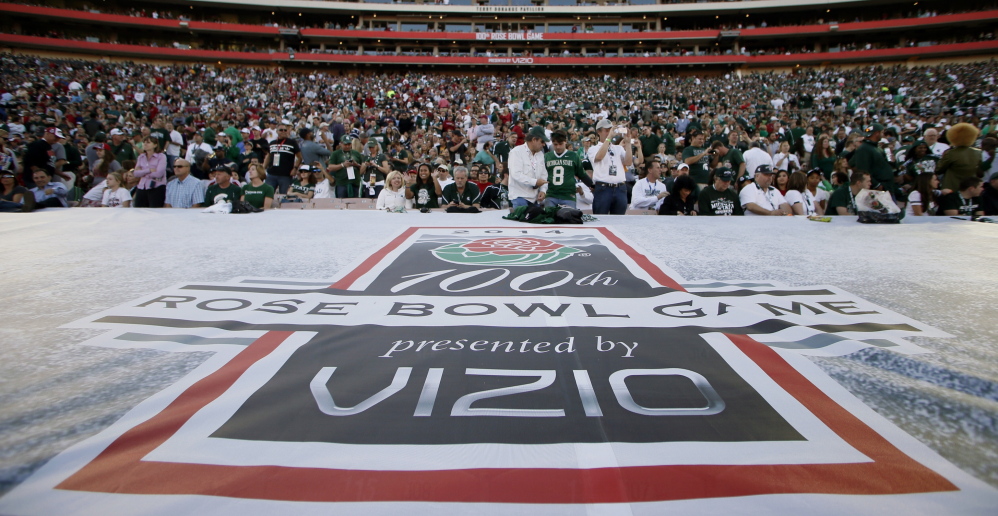SAN FRANCISCO — Ready! Set! Hut, hut: This holiday season’s blitz of college football bowl games will feature a reshuffled roster of corporate sponsors spending millions to thrust their names in front of fans watching on TV and in the stands.
The bowls haven’t disclosed their asking prices, but sports marketing experts contacted by The Associated Press estimated the annual cost for the top-tier games ranges from $25 million to more than $30 million. That’s up from $16 million to $20 million previously.
The substantial price increase probably prompted sponsors to reassess the value of the bowl affiliations, said Kevin Adler, chief engagement officer for sports marketing specialist Engage Marketing in Chicago.
Twelve of the 33 bowls returning from last year have sold their naming rights to new sponsors, including several that defected from one game to another.
Five other bowls are making their debuts during this holiday season, and three of them – the Popeyes Bahamas Bowl, the Raycom Media Camellia Bowl and the Ford Motor Quick Lane Bowl – are kicking off with corporate affiliations.
This year’s list of new sponsors include:
• Iconic tire maker Goodyear, which bought the naming rights to the Cotton Bowl in a promotional expansion beyond its well-traveled blimp.
• Duck Commander, a Louisiana company sponsoring the Independence Bowl in its home state to introduce itself to people who don’t watch the “Duck Dynasty” reality-TV series.
• BitPay, a 3-year-old startup that is using the St. Petersburg Bowl in Florida to enlighten a broader audience about bitcoin, a digital currency that so far has appealed mostly to computer geeks, speculators and crooks trying to conceal their financial footprints.
“We are hoping the audience watching the game at home, in sports bars, airports and hotels is going to be Googling to find out more about bitcoin,” said Stephanie Wargo, BitPay’s vice president of marketing. More than 100 merchants in a “Fan Zone” located near the St. Petersburg Bowl also will be accepting bitcoins from customers leading up to the Dec. 26 game.
BitPay, a bitcoin processing company, made a three-year commitment to take over the St. Petersburg Bowl naming rights from Beef O’Brady’s, which ended a five-year affiliation with the game.
Evolving sponsors have become part of the college bowl tradition since the games began auctioning off their naming rights several decades ago to help cover their rising costs. The Holiday Bowl in San Diego has gone through seven sponsors since its 1978 inception.
While some college football fans still lament the commercialization of the sport, bowl directors say the games couldn’t go on without the naming rights fees to supplement the revenue from ticket sales and TV broadcasting rights.
“It’s critical, you can’t survive without a sponsor,” said Gary Cavalli, executive director of the Foster Farms Bowl in Santa Clara, California.
After selling its naming rights to two different corporate sponsors during the first 11 years of its existence in San Francisco, Cavalli’s bowl played last year without a business backer – and lost more than $100,000 despite cost-cutting.
The bowl is in better shape after Foster Farms decided that attaching its name to a college bowl would be a good way to sell more chicken wings.
“We know that Americans love football, and we know Americans love to eat chicken while they are watching football, so it’s a perfect fit from that perspective,” says Bryan Reese, a Foster Farms’ senior vice president.
Only four of the 38 bowl games scheduled to be played from Saturday through Jan. 4 weren’t able to sell their naming rights.
This year’s revised line-up of bowl names stems in part from college football’s new system for determining a national champion.
Four teams are now selected to compete in playoffs that begin with a semifinal round in two bowl games played on New Year’s Day.
The semifinals will be played at the Rose Bowl and Sugar Bowl this season, then rotate among the Cotton Bowl, Orange Bowl, Fiesta Bowl and Peach Bowl.
The added drama of a playoff for the national championship prompted ESPN to pay more for the broadcasting rights to the games, resulting in an increase in the price for the naming rights.
Send questions/comments to the editors.



Success. Please wait for the page to reload. If the page does not reload within 5 seconds, please refresh the page.
Enter your email and password to access comments.
Hi, to comment on stories you must . This profile is in addition to your subscription and website login.
Already have a commenting profile? .
Invalid username/password.
Please check your email to confirm and complete your registration.
Only subscribers are eligible to post comments. Please subscribe or login first for digital access. Here’s why.
Use the form below to reset your password. When you've submitted your account email, we will send an email with a reset code.